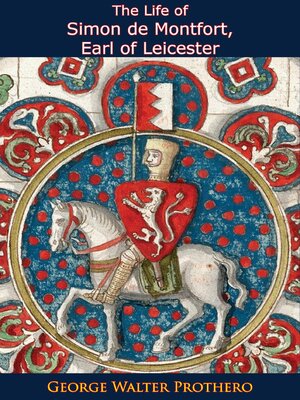The Life of Simon de Montfort, Earl of Leicester
ebook ∣ With Special Reference to the Parliamentary History of His Time
By George Walter Prothero

Sign up to save your library
With an OverDrive account, you can save your favorite libraries for at-a-glance information about availability. Find out more about OverDrive accounts.
Find this title in Libby, the library reading app by OverDrive.



Search for a digital library with this title
Title found at these libraries:
| Loading... |
The man who finally gave to English freedom its second and more lasting shape, the hero and martyr of England in the greatest of her constitutional struggles, was SIMON of MONTFORT, Earl of Leicester.
"Simon V de Montfort, 6th Earl of Leicester (1208 – August 4, 1265) was the principal leader of the baronial opposition to King Henry III of England, his brother-in-law...In 1240, he left for Jerusalem to take part in the Crusades. He then joined Henry in France where he was campaigning to secure his Gascony dukedom. De Montford was a skilled soldier...
In 1254, however, he led Parliamentary opposition to Henry's demand for additional finances to pay for his war in Wales followed by his involvement in Sicily. As discontent with Henry's wars and demands for subsidies grew, Parliament demanded reforms...Henry agreed to reforms, including a council of fifteen to which governance was delegated. In 1261, when Henry repudiated the reforms and assumed direct power, de Montfort left the country. In 1263, he was invited back by the barons and revolt followed. After the rebellion of 1263-1264, de Montfort became de facto ruler of England and called the first directly-elected parliament in medieval Europe. Inclusion of commoners in governance went too far for some of the barons, who, joining forces with Henry's son, the future Edward I of England rebelled. De Montfort is regarded as one of the progenitors of modern parliamentary democracy. The right of the people to constrain kingly rule and to share in governance began the process of creating a nation-state. If kingdoms had been more or less the personal estates of their rulers, nations may still be headed by an hereditary monarch but all citizens had equal rights including the right to vote for a government that was of, by and for the people."-NW Enclyclopedia.
"Simon V de Montfort, 6th Earl of Leicester (1208 – August 4, 1265) was the principal leader of the baronial opposition to King Henry III of England, his brother-in-law...In 1240, he left for Jerusalem to take part in the Crusades. He then joined Henry in France where he was campaigning to secure his Gascony dukedom. De Montford was a skilled soldier...
In 1254, however, he led Parliamentary opposition to Henry's demand for additional finances to pay for his war in Wales followed by his involvement in Sicily. As discontent with Henry's wars and demands for subsidies grew, Parliament demanded reforms...Henry agreed to reforms, including a council of fifteen to which governance was delegated. In 1261, when Henry repudiated the reforms and assumed direct power, de Montfort left the country. In 1263, he was invited back by the barons and revolt followed. After the rebellion of 1263-1264, de Montfort became de facto ruler of England and called the first directly-elected parliament in medieval Europe. Inclusion of commoners in governance went too far for some of the barons, who, joining forces with Henry's son, the future Edward I of England rebelled. De Montfort is regarded as one of the progenitors of modern parliamentary democracy. The right of the people to constrain kingly rule and to share in governance began the process of creating a nation-state. If kingdoms had been more or less the personal estates of their rulers, nations may still be headed by an hereditary monarch but all citizens had equal rights including the right to vote for a government that was of, by and for the people."-NW Enclyclopedia.






